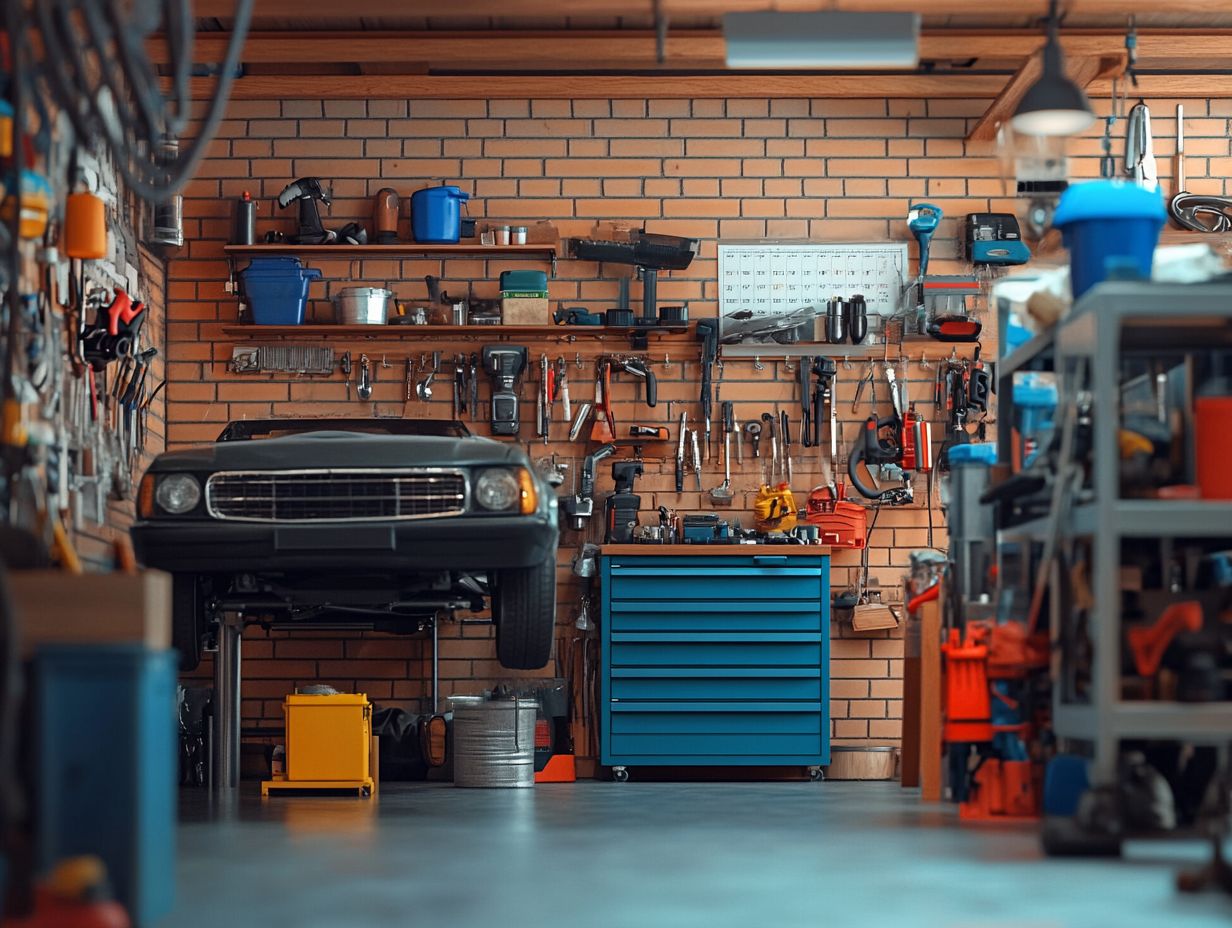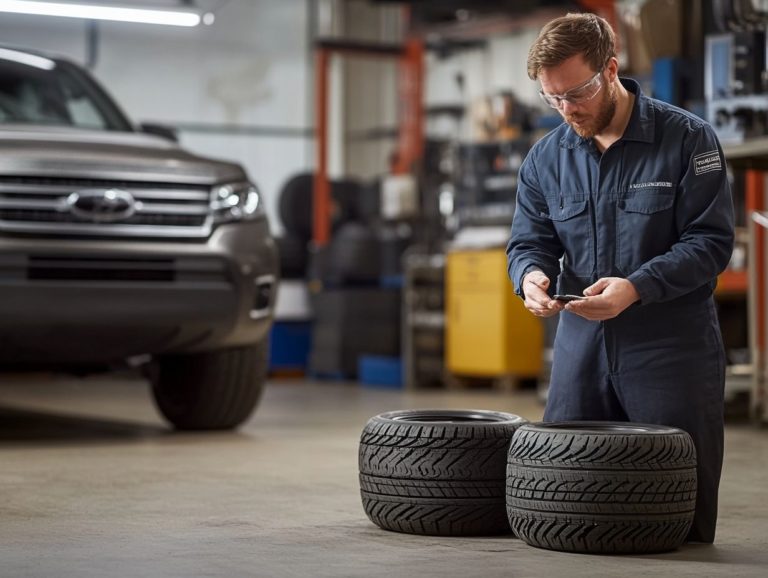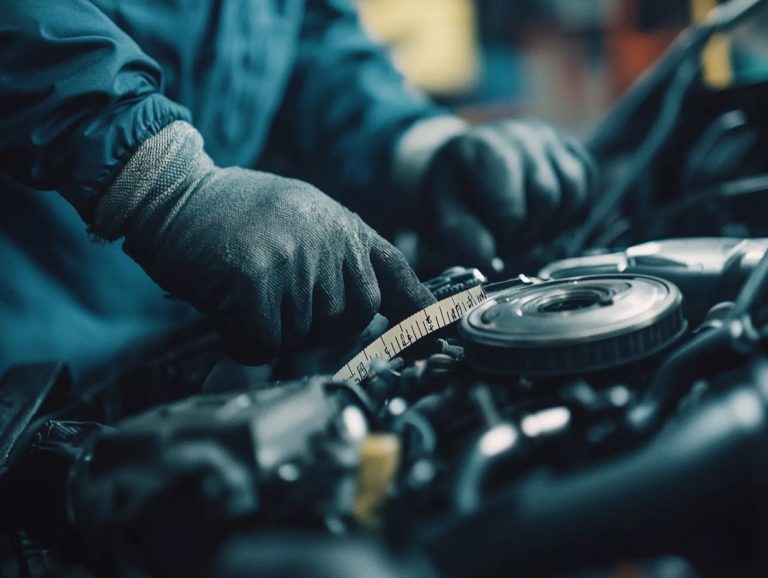How to Prepare for Seasonal Vehicle Maintenance?
Get ready to dive into seasonal vehicle maintenance! Your car deserves the best care to keep you safe and sound on the road.
Seasonal vehicle maintenance transcends mere routine; it s a vital practice that guarantees your car operates smoothly and safely year-round.
Understanding what seasonal maintenance involves is key, along with recognizing its benefits for both performance and safety. Preparing effectively is part of the equation as well.
Whether you enjoy rolling up your sleeves or prefer to enlist professional services, it s important to weigh the pros and cons of each approach.
From tire care to fluid checks, you ll discover the essential tasks that keep your vehicle in peak condition. You ll also learn how to craft a long-term maintenance schedule that seamlessly integrates into your lifestyle.
Embark on this journey as you explore the essentials of ensuring your vehicle is ready for every season.
Contents
- Key Takeaways:
- Understanding Seasonal Vehicle Maintenance
- Benefits of Regular Maintenance
- Preparing for Seasonal Maintenance
- DIY vs Professional Maintenance
- Common Seasonal Maintenance Tasks
- Long-Term Maintenance Planning
- Frequently Asked Questions
- What is seasonal vehicle maintenance?
- Why is it important to prepare for seasonal vehicle maintenance?
- When should I start preparing for seasonal vehicle maintenance?
- What tasks should I include in seasonal vehicle maintenance preparation?
- Can I do seasonal vehicle maintenance myself or should I take it to a professional?
- How often should I perform seasonal vehicle maintenance?
Key Takeaways:

- Regular seasonal vehicle maintenance is crucial for keeping your vehicle in top condition and ensuring its safety and performance!
- Creating a maintenance schedule and following a checklist of necessary tasks can help prepare you for seasonal maintenance and save you from potential problems and costs in the long run!
- While DIY maintenance may save you money, it’s important to weigh the pros and cons and consider seeking professional help for more complex tasks to ensure proper care for your vehicle!
Understanding Seasonal Vehicle Maintenance
Understanding seasonal vehicle maintenance is essential for any car owner who cares about their vehicle. This method entails adhering to a systematic schedule that aligns with the changing seasons, ensuring that vital tasks such as oil changes, tire rotations, and fluid checks are executed at the right moments.
As a result, regular maintenance not only boosts your vehicle’s driving safety and efficiency but also enhances its overall lifespan and resale value. Whether you’re switching to winter tires in the colder months or performing fluid checks in the summer, tailoring your maintenance strategy to meet seasonal demands is a practice every responsible car owner should embrace.
What is Seasonal Vehicle Maintenance?
Seasonal vehicle maintenance is all about fine-tuning your car care routine to match the whims of the weather and the changing seasons. For those planning adventures, knowing how to prepare for a road trip maintenance goes beyond the standard checklist of oil changes and tire rotations you might be used to.
Rather than sticking to generic maintenance, it emphasizes customized procedures that ensure your vehicle performs at its best all year round. For example, during winter, it’s essential to check antifreeze levels (a liquid that prevents the engine from freezing), battery health, and tire tread depth these checks are crucial for safely navigating icy roads.
As summer rolls in, your focus should shift to inspecting coolant levels, air conditioning systems, and making sure your wiper blades are ready to tackle those surprise rain showers.
By prioritizing these seasonal tasks, you can significantly extend your car’s lifespan and boost safety, giving you peace of mind as you face the diverse challenges of the road.
Benefits of Regular Maintenance
Regular maintenance is essential for enhancing your vehicle’s performance and ensuring your driving safety. This results in a more enjoyable experience on the road. By following a structured maintenance schedule, you can prevent minor issues from snowballing into expensive repairs.
Keeping detailed maintenance records not only helps you monitor your vehicle’s health but also boosts its resale value when you decide to sell or trade it in. Routine checks on critical components like oil changes, tire pressure, and brake inspections greatly contribute to the longevity and reliability of your vehicle.
Start your seasonal maintenance today to enjoy a safer ride tomorrow!
Improving Vehicle Performance and Safety
Improving your vehicle’s performance and safety is within your grasp, thanks to a range of maintenance tips that focus on essential components like engine health and fluid checks.
Regular inspections are key; they give you the power to spot potential issues before they spiral out of control. Routine checks on tire pressure and tread depth are crucial for ensuring optimal traction and handling. Keeping an eye on your brakes can help avoid dangerous situations on the road.
Don t overlook the condition of your vehicle s battery a weak battery can catch you off guard with unexpected breakdowns. Establishing a schedule for oil changes and filter replacements not only boosts engine efficiency but also aligns with emissions standards.
Prioritizing these maintenance practices can dramatically extend your vehicle s lifespan and keep you safe on the road!
Preparing for Seasonal Maintenance

Preparing for seasonal maintenance requires you to take action, and creating a comprehensive checklist is key to ensuring that no essential tasks slip through the cracks.
Your checklist should include critical items like checking tire pressure, inspecting wiper blades, and making sure your emergency kit is fully stocked for any unexpected situations.
Moreover, integrating car care tips tailored to the changing seasons can substantially boost your vehicle’s performance and longevity. By methodically preparing for these seasonal changes, you can significantly reduce the risks associated with driving safety and vehicle reliability.
Checklist for Necessary Tasks
A well-structured checklist for necessary tasks can streamline your approach to seasonal vehicle maintenance, ensuring that vital inspections are conducted regularly.
Integrating essential components such as fluid checks, tire inspections, and brake maintenance can safeguard your investment while enhancing safety on the road. Regularly examining oil, coolant, transmission fluid, and brake fluid levels will help you achieve optimal performance and extend the life of key engine components.
Inspecting tire treads and maintaining proper air pressure not only boosts fuel efficiency but also enhances handling and traction. Prioritizing brake assessments taking a close look at pad thickness and responsiveness can help avert potential hazards.
Creating a comprehensive seasonal checklist gives you the power to schedule maintenance effectively, cultivating a proactive approach to your vehicle’s health.
DIY vs Professional Maintenance
Regarding vehicle care, you may find yourself contemplating the merits of DIY maintenance versus opting for professional services. While tackling minor fixes on your own can be a wallet-friendly choice, it demands a certain level of skill and comfort with tools.
On the flip side, professional maintenance offers a thorough vehicle check and often includes warranties on repairs, delivering that coveted peace of mind. Don’t risk your safety consider professional help for complex issues.
By grasping the strengths and weaknesses of each approach, you can make a well-informed decision about the best way to care for your vehicle.
Pros and Cons of Each Option
Evaluating the pros and cons of DIY maintenance versus professional maintenance allows you to choose the best approach for your vehicle s care needs.
While you might relish the thought of rolling up your sleeves for routine tasks like oil changes and tire rotations at home, you may also find comfort in entrusting trained technicians to handle crucial inspections and repairs with the expertise they bring.
Going the DIY route can save you money and help you understand your vehicle better. However, this approach may also lead to oversights or errors when faced with more complex issues, such as brake replacements (changing old brakes for new ones to ensure safe stopping) or engine diagnostics.
Conversely, opting for professional maintenance provides the assurance of remaining compliant with warranty requirements and grants you access to advanced tools and techniques. Yet, this peace of mind often comes with a higher financial investment. Weighing these factors carefully can guide your decisions on maintenance effectiveness and long-term vehicle reliability.
Common Seasonal Maintenance Tasks
Common seasonal maintenance tasks are vital for ensuring that your vehicle is ready for changing weather conditions and how to prepare for a road trip maintenance check to keep it in top shape all year round.
These tasks include tire care and rotation, essential for optimal grip and fuel efficiency. Regular fluid checks are equally important, helping to prevent engine overheating and other potential issues.
Battery inspections are vital during colder months to avoid unexpected failures. Focus on these areas to supercharge your vehicle’s performance and reliability!
Tire Care and Rotation

Tire care and rotation are key parts of your seasonal maintenance routine. They significantly impact your driving safety and overall vehicle performance.
By maintaining your tires, you enhance traction and handling, while minimizing the risk of blowouts and accidents. Regular tire rotation distributes wear evenly, extending the lifespan of your tires and ensuring predictable handling.
Routine pressure checks help avoid issues like low tire pressure, which can decrease fuel efficiency and compromise safety. By following these vital practices, you can enjoy a smoother driving experience and reduce the chances of unexpected breakdowns.
Fluid Checks and Changes
Fluid checks and changes are crucial for keeping your car in top condition. They allow essential systems like the engine and cooling system to operate effectively.
Regularly monitoring and replacing key fluids such as engine oil, coolant, and brake fluid can help you avoid costly repairs. Engine oil lubricates moving parts, minimizing friction. Coolant regulates temperature, preventing overheating. And don t forget brake fluid it’s essential for safe stopping power!
Ignoring these fluids can lead to breakdowns when you least expect it! Establishing a fluid maintenance schedule a plan to check and replace your vehicle’s fluids regularly boosts your vehicle’s reliability and extends its lifespan.
Battery Inspection and Replacement
Regular battery inspection and maintenance are essential for extending your vehicle’s life and avoiding surprises on the road.
By keeping an eye on these checks, you can catch early warning signs of battery trouble, like slow engine cranking or dimming headlights, which often signal a weak power source. Overlooking these hints can lead to a complete battery failure, stranding you and causing unnecessary inconvenience.
Recognizing the significance of battery care enhances your vehicle’s reliability and fuel efficiency, saving you money in the long run. Routine maintenance, such as cleaning terminals and ensuring tight connections, is vital for your battery s health, ensuring your vehicle starts smoothly every time.
Long-Term Maintenance Planning
Long-term maintenance planning is your strategic ally in vehicle care. It ensures that essential tasks are meticulously scheduled to optimize performance and extend your vehicle’s lifespan.
By establishing a structured maintenance schedule, you can anticipate necessary inspections and repairs, preventing costly breakdowns down the line. This proactive approach boosts your vehicle s reliability and preserves its resale value, giving you peace of mind as you make smart choices for your investment.
Creating a Maintenance Schedule
Creating a maintenance schedule is crucial for your vehicle s long-term care. It helps you keep track of essential tasks and optimize performance.
Break down tasks by mileage and time intervals. This way, you’ll never overlook critical maintenance points like oil changes, brake inspections, and tire rotations.
Consult your manufacturer s manual for specific recommendations on service frequency and types tailored to your vehicle’s model.
Using digital tools or apps for vehicle maintenance makes tracking your service history easy. These tools send reminders for upcoming tasks and store past records for quick reference.
Regularly review and adjust your schedule. This practice can significantly extend your vehicle’s lifespan and boost safety and efficiency on the road.
Frequently Asked Questions

What is seasonal vehicle maintenance?
Seasonal vehicle maintenance involves regular checks and inspections based on changing weather and road conditions. Key tasks include checking and changing fluids, inspecting tires, and general tune-ups.
Why is it important to prepare for seasonal vehicle maintenance?
Preparing for seasonal maintenance keeps your vehicle running smoothly and safely. Referencing the ultimate checklist for seasonal car maintenance also helps prevent costly repairs and ensures readiness for various weather conditions.
When should I start preparing for seasonal vehicle maintenance?
Begin preparing a few weeks before the weather changes. For instance, if winter is near, start prepping your vehicle in the fall.
What tasks should I include in seasonal vehicle maintenance preparation?
Include checking and changing fluids, inspecting and replacing tires, testing the battery, checking heating and cooling systems, and performing a general tune-up.
Can I do seasonal vehicle maintenance myself or should I take it to a professional?
You can handle basic tasks yourself, but it s wise to take your vehicle to a professional for seasonal maintenance. They have the expertise and tools for proper inspections.
How often should I perform seasonal vehicle maintenance?
Perform seasonal maintenance at least twice a year: once in the fall before winter and once in the spring before summer. If you face extreme weather, consider more frequent maintenance.






